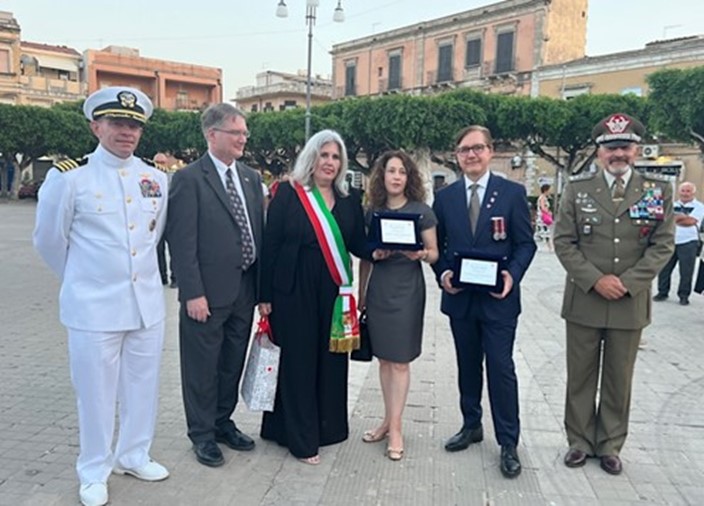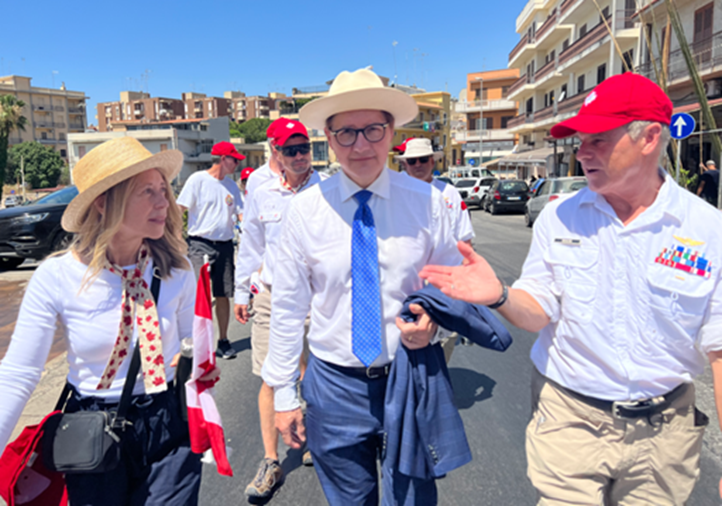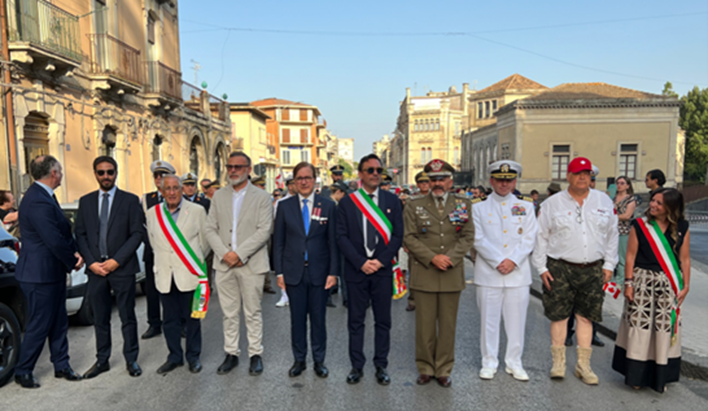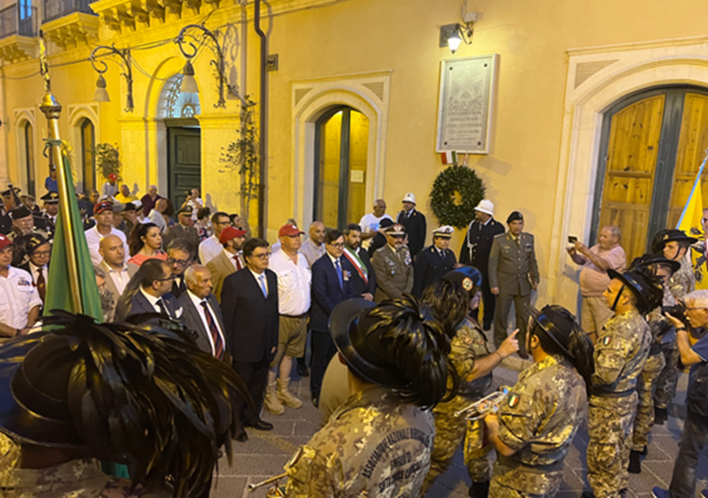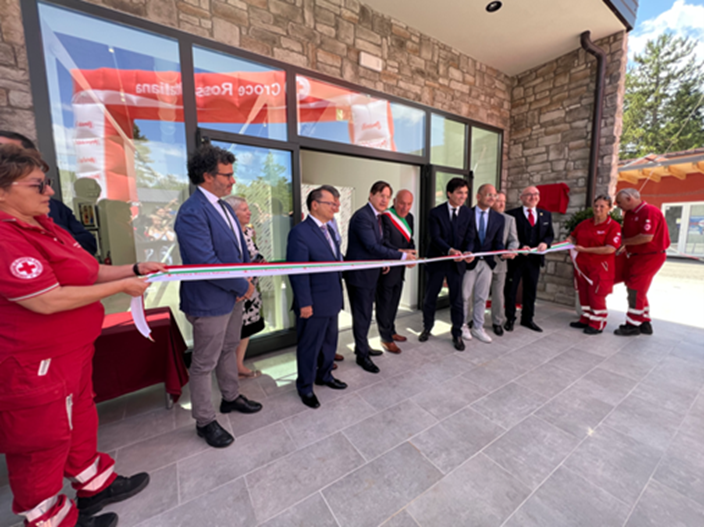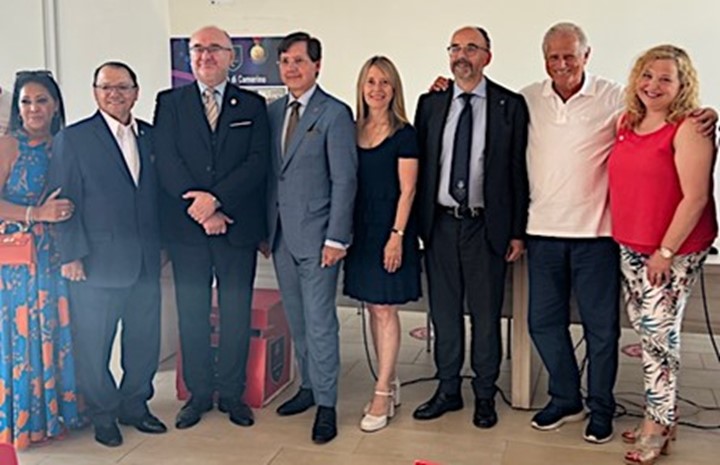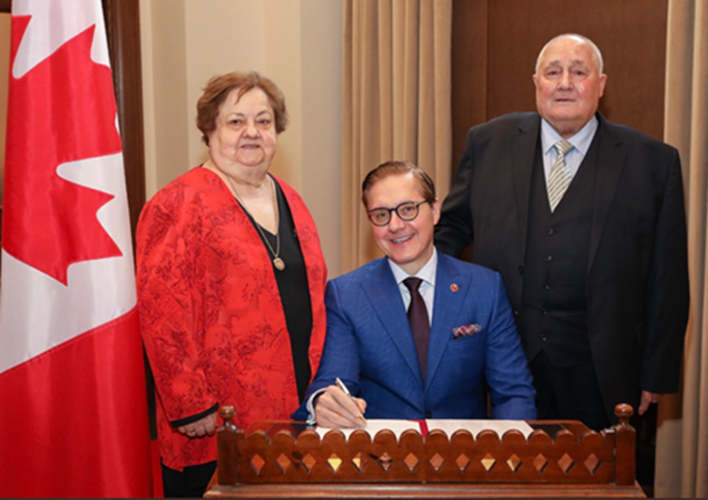Senator Loffreda: “Reflecting on My Dual Inheritance as a Proud Italian Canadian”
Senator Loffreda shares with us his monthly column. For his first column of 2024, the Senator opted to write, exceptionally, a long piece in which he reflects on his heritage as a Canadian of Italian descent and looks back fondly on his most recent visit to Italy last summer to take part in the Walk for Remembrance and Peace in honour of our Canadian soldiers who participated in Operation Husky in 1943. The Senator’s visit also coincided with the inauguration of a new community centre in Muccia and a new student residence at the university in Camerino for which the Italian-Canadian community had raised funds after the 2016 earthquakes that struck Italy. At the bottom of the article, a photo gallery from Senator’s visit to Italy.
As I sat on the terrace of our hotel room in Rosolini, Italy on the morning of July 11, 2023, I sipped my espresso. Under the hot morning Sicilian sun, I admired the beauty surrounding me. I put my phone away, which is something I seldom do. I did this so I could fully embrace the moment and soak it all in. I knew this day would be a very emotional day.
Here I was, with Angelina, my wife of almost forty years, near the most southern tip of Sicily, on a journey of commemoration for those who fought and died during the Second World War during Operation Husky. When Angelina and I decided to travel to Italy to participate in this memorial walk on our own initiative, we knew it would be a moving experience, and of course an exhausting one too. We felt so strongly and passionately about this project that we decided to personally pay for our entire visit, with no public funds being used during our travels abroad. It was heartwarming to see so many Italians join us for different parts of our journey.
Formally known as the Walk for Remembrance and Peace (WRAP), and organized by Steve Gregory, a Montréaler with close ties to the Canadian Armed Forces, this journey through Sicily would begin on the beaches of Pachino and end in the dramatic mountainscape of Adrano. Our group would literally follow in the footsteps of the 25,000 brave men of the 1st Canadian Infantry Division who joined our Allied forces in the summer of 1943. Eighty years later, in the summer of 2023, hundreds of volunteers, military personnel, civilians and Sicilians were coming together – over the course of three weeks and 325 kilometers – to pay tribute to the Canadian soldiers who fought for peace and helped liberate Italy from Mussolini’s stranglehold and from German occupation.
Throughout our journey, which we coined the Canadian Cammino, commemorative markers were placed for each of the fallen Canadian soldiers – 562 in total. Every day, we gathered to pay tribute to those who paid the ultimate price all those decades ago. For example, at the Canadian War Cemetery in Agira, Canadian tombstones were finally assigned the faces of most of our fallen soldiers. The site contains the graves of 490 Canadians, six of whom remain unidentified some eighty years later. A local man, who works at the cemetery, shed tears as he saw, for the very first time, the faces of the brave men who helped liberate his country.
It was a touching moment which reminded me of the privilege we have of living in “the True North strong and free”. Canadians often take for granted the price of war and peace. In our minds, wars and conflicts take place in foreign lands, far from our borders, and yet, Canada has a rich and proud military history and peacekeeping legacy. A war on our own soil is a foreign concept to us.
While we can appreciate the disastrous impact and destruction of wars on nations and their people, we may not fully grasp the long-term effects wars can have on citizens. Indeed, eighty years later, as we crisscrossed Sicily, residents embraced our presence with open arms and commended us for honouring our men in uniform. Many shared touching stories with us of the legacy of our Canadians Forces who had made meaningful and lasting contributions to Italy at a time when it needed us the most. We heard heartfelt testimony from families who lost loved ones during the war. Many of these stories brought me to tears as they hit close to home.
Which brings me back to that fateful day of July 11th last summer. On day 3 of our Canadian Cammino, our group ventured from Ispica and walked five kilometers north to Rosolini. In 1943, the Canadian 1st Brigade helped re-establish order in this small town where, despite the devastation from naval bombardment, Allied soldiers were greeted with smiles, handshakes, and shouts of welcome and appreciation. Our group felt equally welcomed when we ventured to the town square that day. This time around, we were greeted by members of the Bersaglieri, the Italian Army’s infantry corps. Easily identified by their wide-brimmed hats with large black feathers, the troops joined us for our commemoration.
My father and my great uncles were members of this infantry. To be in their presence in Italy, as we honoured our Canadian troops and as I addressed the large crowd gathered for the ceremony, was certainly a full circle moment. I am grateful every day that my father Alfonso, who was born in 1937, was never called to combat to defend his homeland in later years and survived the war. Regretfully, however, my maternal grandfather, Nicola D’Onofrio, died as a civilian during the last days of the war, along with three of his brothers who never came back from battle and whose bodies were never found. As we stood in Agira before the tombstones of the unknown Canadian soldiers, I had a special thought for my great uncles who were never afforded a proper send-off and a final resting place where my family could gather and honour them.
Moments like these were plentiful throughout our journey. Italians were grateful. Everywhere we went and everyone I spoke with appreciated the sacrifice of our Canadian soldiers who courageously crossed the Atlantic Ocean. They travelled thousands of miles to a foreign land that most, probably simply knew, as the big boot on the world map. There, they joined our Allied partners in the fight against tyranny. Of course, as we journeyed through the hills and valleys of Sicily, I couldn’t help but think: What if ? … What if my parents had never left Italy in 1962?
The truth is life was difficult in post-war Italy. When my grandfather died in the war as a civilian, he left behind his grieving wife Veronica. Now heartbroken and widowed, she had to single-handedly provide and care for her seven children during a time of global uncertainty and post-war instability. This was a period during which a destroyed nation (one among many throughout Europe and elsewhere) had to crawl out of the rubble and rebuild. Many families continued to struggle emotionally and financially. Times were very difficult.
Severely devastated by the war, my grandmother left her wonderful village of San Gregorio Matese, 60 kilometres north of Naples, and started her life over. Remarkably and successfully, she raised seven outstanding individuals including my mother Maria, who was only four years old when she lost her father. I regret I never had the honour to meet him, but his memory and sacrifice lives on.
My family, like many European families whose communities were devastated by the war, struggled through post-war poverty, but survived and learned how to enjoy the simple pleasures and necessities of life. Values such as hard work and commitment, community, kindness and altruism, spirituality, integrity and humility were the bedrock of my mother’s upbringing. These qualities were passed on to her by my grandmother Veronica.
Equipped with these core values and determined to have a better life, my mother and my father, who met in 1956 and married in 1961, made the heart-wrenching decision to leave Italy in 1962 and make their way to Canada. To them, Canada was a land of hope and dreams, where we already had family who had immigrated to Montréal. Canada had always been, and continues to be, a welcoming land of opportunity. It has been the place I have called home my entire life and I wouldn’t want it any other way.
But as I asked earlier: What if? When I ask myself that question, the first thing that comes to mind is my parents and my family. If my parents would have never left Italy more than a half century ago, I would not be where I am today. The thought of having a different life, without my wife and kids, is unimaginable. In actuality, the very thought of it is terrifying.
If it wasn’t for my parents’ courage and commitment to giving their future children a better life, my own life would have taken a different path, perhaps a more tumultuous one. Although for our family, like many young immigrant families who came to Canada, life wasn’t always easy either. Yes, Canada was welcoming, and it allowed our family to successfully integrate into the Canadian social fabric, but thank goodness, we had my mother’s moral compass and my father’s resilience and fervour.
The values that were instilled in my parents during those two decades in Italy were at the heart of our family unit here in Canada. These values have guided us – my brother, my sister and I – throughout our lives, both personally and professionally. Angelina and I have done our very best in passing those values down to our two adult children. Being in Italy last summer brought back all these vivid memories of my own upbringing and the road I have travelled. I’ve always been quite appreciative of my parents’ sacrifices and grateful for the life they provided us. I am particularly proud of my Italian heritage. In fact, my father always reminds me that we don’t speak Italian, but we speak the Neapolitan dialect, a true testament to our historical roots in Naples.
There is no doubt in my mind that if it wasn’t for my parents’ sheer determination, I would not have had such an enjoyable childhood and upbringing, and I certainly would not have had a successful career in the financial and banking sectors. I owe so much to them. Undeniably, my parents are the ones who paved the way for me – one brick at a time. As the old saying goes, Rome wasn’t built in a day. In truth, and over time, my parents carefully laid each brick – a lesson here, a hug there, a bit of tough love, and a lot of guidance, support, and encouragement along the way. It is that road that eventually led me to the Senate of Canada where I have had the privilege and distinct pleasure of serving Canadians since 2019.
Indeed, serving Canadians is the highest honour of my life. Giving back to my community, and now to my country, has always been an integral part of my being. As a senior bank executive, it always felt natural and second nature for me to give back to those in need and to help our communities prosper. I rarely missed an opportunity, on behalf of RBC, the National Bank or on my personal initiative, to help raise funds for worthy causes both here and abroad. When I was in Italy last summer, it was such a gratifying moment to witness first-hand the positive impact that one particular fundraising initiative I was involved with had on an entire community. This helped strengthen the already robust relationship that links Canada and Italy.
The timing could not have been better. My visit to Italy coincided with a special commemoration in Muccia and Camerino, two towns that were severely impacted by the earthquakes that rocked central Italy in August and October of 2016. At the time, and in solidarity with our Italian brothers and sisters, the Italian community in Canada quickly mobilized and helped raise over two million dollars for Italy’s rebuilding efforts. These funds helped build new state-of-the-art facilities in both towns: a community centre in Muccia and a student residence at the university in Camerino. It was a privilege to attend these inauguration ceremonies and I felt much pride in our community back home in Canada as I walked through the facilities. In response to a natural disaster of great proportion, we came together to provide support and assistance to those in need, in typical Canadian fashion!
Like my own personal mantra of giving back to others, Canadians and Italians are similar insofar that they are generous and caring people. I feel we have this collective sense of civil responsibility to help community members pull together. As they say, it takes a village! When we are called upon, we always answer without hesitation. This was the case in 2016 after the earthquakes and it was the case eighty years ago when 25,000 brave Canadian men joined our Allied forces in Operation Husky.
As I look back fondly on my journey in Italy last summer, I am reminded of something Prime Minister Trudeau said on May 27, 2021. It was on that day that our Prime Minister rose in the House of Commons to deliver an official apology for the internment of Italian Canadians during the Second World War. He explained how Canada did not have to declare war on Italian Canadians the day the House of Commons declared war on Mussolini’s fascist regime in 1940. Some 31,000 Italian Canadians were labelled “enemy aliens” and over 600 men were arrested and sent to internment camps during the war. These were law-abiding citizens whose only “crime” was their ancestry.
As he offered his apology to Italian Canadians, the Prime Minister declared:
“Chiediamo scusa. To all those who were affected by this chapter of our history, we are sorry. Your families and your communities did not deserve this injustice. And despite everything, despite that dark time, you continue to look to the future. I’ve heard your stories. We have heard your stories. How, once your parent or grandparent was released, they worked hard to give back to their country, despite how its government had treated them. Every thriving business these men and women rebuilt or local charity they started was a testament to their commitment to Canada… It would have been so easy to turn their backs on Canada. Instead, they put their backs into building it. That is their legacy. And it is a legacy that lives on today.”
That is the legacy of my family and our entire community! It is a legacy that is shared among both of our people.
When I was in Sicily last year, I was moved by the sheer resilience of Italians – from one generation to the next – who, after the atrocities of the Second World War, picked themselves up and rebuilt. Like immigrants who came to Canada post-1945, they met the post-war challenges head-on with courage and conviction. As the Prime Minister said, Italian Canadians put their backs into building Canada as did Italians who helped rebuild their country after the war. There were struggles along the way, and many bumps and hurdles on the road, but they forged ahead.
My travels throughout Italy last summer reminded me that this commonality of overcoming struggles and adversity is something our two people share. In fact, I returned to Canada from my visit to the motherland more grateful than ever that I have the honour of exhibiting and representing the legacies of both people and the values we share.
I am fuelled by this dual inheritance. I am proud of my roots, and as the first Canadian born Senator of Italian descent, I am committed to continuing to promote, strengthen and improve relations between our two nations and further collaborate on issues of mutual interest. In the end, our personal visit to Italy last summer – to honour Canada and to celebrate Italy – was the perfect opportunity for us to renew with our heritage and to bask in all things Italian. In some way, it was a journey of reflection and appreciation that allowed me to take stock of the road travelled and to honour the legacy of my parents and our people. What if? – I would say that it seems to be irrelevant and counterintuitive at this point. My parents’ courageous decision to emigrate to Canada has helped make me the kind of person I am today.
The Honourable Tony Loffreda
Independent Canadian Senator (Québec)
All photos courtesy of the Loffreda family, except figure 4 courtesy of Senate Communications

